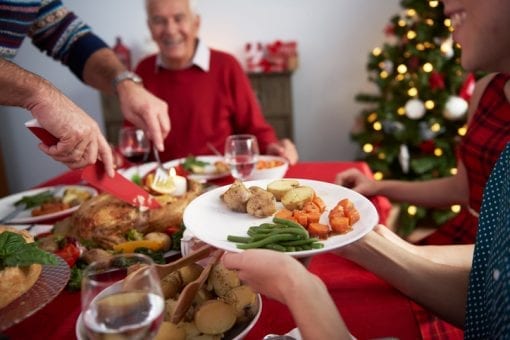 For many, the holidays are a joyous time to celebrate cheer, family, friends and loved ones. The holiday season is in full swing after Thanksgiving and it is hard not to step out of your home with hearing holiday music and seeing festive decorations like Christmas trees, lights, snowmen, gingerbread houses and advertisements for endless holiday sales. It is so easy to become wrapped up in shopping, parties and all the holiday treats and it is equally as easy to forget those who are struggling around the holidays. Just as the holiday season can bring joy and celebration for many, it can also bring negative stress and anxiety for many who find this time of year to be triggering. This season can be a remembrance of loss and heartache and can bring stress to those who struggle with depression, anxiety, eating disorders and other mental health illnesses. Many turn to negative coping mechanisms such as emotional eating to fill their void around this time of year.
For many, the holidays are a joyous time to celebrate cheer, family, friends and loved ones. The holiday season is in full swing after Thanksgiving and it is hard not to step out of your home with hearing holiday music and seeing festive decorations like Christmas trees, lights, snowmen, gingerbread houses and advertisements for endless holiday sales. It is so easy to become wrapped up in shopping, parties and all the holiday treats and it is equally as easy to forget those who are struggling around the holidays. Just as the holiday season can bring joy and celebration for many, it can also bring negative stress and anxiety for many who find this time of year to be triggering. This season can be a remembrance of loss and heartache and can bring stress to those who struggle with depression, anxiety, eating disorders and other mental health illnesses. Many turn to negative coping mechanisms such as emotional eating to fill their void around this time of year.
Day after day, year after year, beginning in childhood, we learn to associate food with comfort — a sensual physical experience that can always be depended on to provide immediate pleasure. We carry this correlation into adulthood, turning to food for adult reasons. Comfort eating is an emotional response to pain, discomfort or fear and many depend on food to fill an emotional void such a dealing with a breakup, a fight with a friend, the loss of a job or just getting through the holiday season.
Filling a void
Emotional eating, although not a formal eating disorder recognized by the American Psychiatric Association (APA) or The Diagnostic and Statistical Manual of Mental Disorders, Fifth Edition (DSM-5) as an official eating disorder; is a problematic behavior associated with poor coping skills, food obsession and body image. Additionally emotionally eating is characterized by consuming fatty, carbohydrate rich, sugary foods instead of healthy, nutritious foods to cover up our negative feelings or fill a void. These patterns often times lead to weight gain and excessive dieting which can eventually lead to eating disorders such as anorexia nervosa, binge eating disorder or bulimia nervosa. Although emotional eating is not necessarily dangerous in itself; it can potentially lead an individual to develop an eating disorder, which can result in severe emotional, mental and physical consequences.
Learning how to overcome holiday triggers
The holidays can be triggering for individuals who struggle with eating disorders. It may feel like every aisle of the grocery store has even more sweets than usual and the dessert table at every holiday function is more appealing than ever. Consuming all the sugary holiday treats may be a short-term solution to filling an emotional void but overtime, over indulging or binging during this time of year can result in eating disorder relapse. Once the temporary sugar high wears off, the empty feelings will resurface with even more guilt and shame than before. In order to stay healthy around the holidays and avoid going down the road of emotional eating, there are a few steps you can take to keep a positive mindset and avoid any triggering situations.
- Keep the holidays simple: You do not have to spend a lot of money on gifts or decorations or feel as though you must attend every holiday party. The holidays can be a time for you to simply reflect on this past year and spend some time with your loved ones.
- Keep your recovery a number one priority. Attend therapy sessions, reach out to your support system and set boundaries. Although this time of year can be triggering, ultimately you have control of what activities you choose to participate in.
- Always have a relapse plan in place. If you do relapse, do not feel that you have failed, but remember it is a learning tool for your recovery journey. It is about knowing what we can manage and not at various points along the way.
- Stick with your daily routine. Following your daily routine is also a part of keeping the eating disorder at bay during the holidays. Being able to keep to your normal sleep, eating, and body movement routines can help you be your best mental, physical, and emotional self.
- Love yourself and practice self-care. Remember that you are a number one priority. If you feel overwhelmed it is okay to stay home. Take time to engage in activities that make you happy. Do not let other dictate your happiness.
